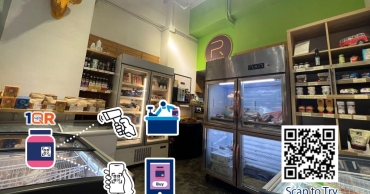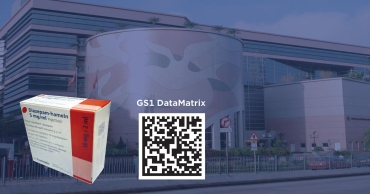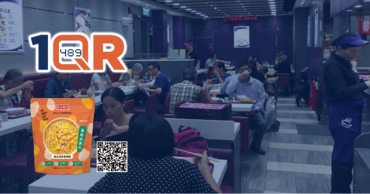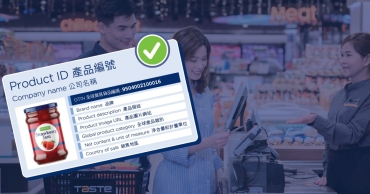Why use authorised GS1 Barcodes?
GS1 system is used by manufacturers, distributors and retailers all over the world. You can trust that GS1 barcode numbers issued by an authorised GS1 member organisation are unique, accurate, and based on current global standards.
In Hong Kong, GS1 Hong Kong has the sole mandate to administer the GS1 system and is the only authorised source for GS1 barcode numbers and standards.
Our Hong Kong numbering system
GS1 barcode numbers allocated to companies by GS1 Hong Kong begin with the prefix 489. Only GS1 Hong Kong is authorised to provide GS1 barcode numbers with this prefix.
To safeguard the proper use of GS1 barcodes, we continuously fight against unauthorised use of barcodes such as the following:
Expired barcodes:
Former GS1 members continuing to use company prefixes issued by the GS1 organisation as GTIN;
Barcode transfer:
GS1 members either selling or transferring their company prefixes to other companies or organisations as GTIN;
Counterfeit GS1 barcodes:
Any companies or organisations using GS1 prefixes not issued and registered by GS1, counterfeit GS1 prefixes or GS1 prefixes owned by other GS1 members;
Unauthorised GS1 barcodes:
Non-GS1 organisations issuing GS1 company prefixes to any companies or organisations.
Reuse GS1 Barcode:
A GTIN allocated to a trade item is unique and SHALL NOT be reallocated to another trade item. This applies to ALL trade items, regardless of sectors
Beware of UNAUTHORISED numbering
Unauthorised barcode number sellers undermine the integrity of the GS1 system, create confusion in the market and disrupt the functioning of supply chains in Hong Kong and overseas.
Be aware that when you obtain your GS1 barcode numbers from an unauthorised source, you will incur massive unnecessary expenses on relabelling and repackaging of your products, when your products are rejected by your retailers due to unauthentic barcode numbers.
You will also run into the risk that the unauthorised barcode numbers provided to you are not unique against other numbers directly allocated by a GS1 organisation, which can have significant consequences within the supply chain, particularly in labelling and track and trace.
Potential Risk of Using Unauthorised Barcode:
You may suffer losses by using unauthorized barcode as you need to re-label or repackage your products, or if your products are rejected by your retail customer. You may also result in:
- A lawsuit
- Product cannot be sold in the market because of duplicated number
- Brand image and reputation loss
- Cannot be listed on e-commerce platforms
Measures:
GS1 Hong Kong has joined forces with over 110 GS1 offices around the globe together with major sellers and buyers from Hong Kong and overseas to combat “Unauthorised Uses of Barcodes”. To this end, we have been collecting barcodes on trade items from different industries for verification on a regular basis.
Any of the above-mentioned acts are prohibited. In addition, the Chinese Central Government has announced The Measures for the Administration of Commodity Barcode. Any parties who fail to observe the legitimacy of barcode usage will be prosecuted and fined.
For enquiries regarding the “Unauthorised Uses of Barcodes”, please contact us at +852 2863 9701 or fill in enquiry form by clicking below “Enquiry” button.
For more information: You can refer the GTIN Management Standard for the latest updates at https://www.gs1.org/1/gtinrules/en/
Barcode standards FAQs
What are barcode number unauthorized seller?
Barcode number unauthorized sellers are companies that have bought barcode numbers off other companies and then try to on-sell the numbers.
GS1 has no relationship with these unauthorized sellers, so we can't provide guaranteed information about whether the unauthorized sellers are trying to sell you legitimate, authorised numbers.
We can't know if the barcode numbers they provide are unique against other numbers directly allocated by a GS1 organisation. Also we can't validate these numbers for eCommerce, as we have no means of tracing who the numbers have been assigned to.
What happens if I buy barcode numbers from a unauthorized seller ?
If you buy barcode numbers from a unauthorized seller you do so at your own risk. While all GS1 barcode numbers are legitimate when first created, as soon as a buys a number and on-sells it to you, that number is no longer managed by GS1. This means there is no guarantee that the number will remain unique - which can have significant consequences within the supply chain, particularly in labelling and track and trace.
Where can I get legitimate GS1 barcode numbers?
You can get unique, authorised GS1 barcode numbers from any GS1 member organisation around the world. If you're in Hong Kong, you can get barcode numbers from GS1 Hong Kong. First, you'll need to join GS1.
Each GS1 organisation provides GS1 standards and associated services - including GS1 Company Prefixes and GS1 Global Trade Item Numbers (GTINs or barcode numbers) - to ensure that every one of the millions of barcode numbers in use around the world is unique.
What is the difference between GS1 issued barcodes and barcodes from 3rd party sources? Why use GS1 barcodes instead of 3rd party alternatives
| GS1 barcode numbers | 3rd party / Non-GS1 barcode numbers |
| Get your authenticated GS1 barcodes from GS1 Hong Kong, the ONLY authorised body in Hong Kong to issue GS1 barcodes with “489” country prefix. | Barcodes from unauthorised seller are not authentic and not interoperable i.e. Not globally recognised. |
| A GS1 barcode number is a unique number tagged to your product, allowing you to Identify, Capture & Share your important product information seamlessly. GS1 Hong Kong issued unique barcodes are identifiable in our secured databank and are not recycled or re-sold. | The uniqueness of the numbers cannot be guaranteed as the barcodes may be re-cycled or re-sold to different parties. This could mean that same barcode can be reused on 2 or more different products by different companies, unknowingly. This can cause potential confusion and legal ownership issues. |
| GS1 numbers can be used globally, and are well accepted by major retailers and e-marketplaces like eBay, Amazon, Google Shopping, Tmall. The same GS1 numbers can be used on multiple platforms and enables quick and accurate product searches by consumers. | 3rd party and proprietary numbers would not be recognised globally. This poses the potential risk of not being able to sell in retail stores and on marketplaces and could lead to costs related to product recalls, repackaging and relabelling and low consumer trust. |
| GS1 numbers can help in complying with regulatory requirements (eg. EU1169) such as fulfilling clear product identification and traceability protocols to address food / patient safety, counterfeits, consumer protection issues. | 3rd party and proprietary numbers are not recognised globally and hence, unlikely to help in compliance with regulations. |
| GS1 Hong Kong members could upload their product information to BarcodePlus, a product information repository, for free, which is accessible by their potential buyers from all over the world. | 3rd party resellers do not provide comprehensive support services and cannot back-up the authenticity of their barcodes against GS1 local & global databanks. You may be on your own to resolve any potential issues. |
| Full local support including training sessions, networking events, solutions & consulting services and market surveillances. We also provide advisory support via phone and email. |
What does GTIN Non-Reuse Standard mean?
When a GTIN allocated to a trade item SHALL NOT be reallocated to another trade item. This applies to ALL trade items, regardless of sector.
Why is the need for a GTIN Non-Reuse Standard?
With the industry-driven change, the standard will help companies get unique product identification “right” from the start. Keeping product identification truly “unique” and persistent in both the physical and digital world is needed to support today’s omni-channel consumer experiences. Consistency across the physical and digital world is foundational to the future of commerce.
Trade items (and their associated data attributes) remain in digital/online paths to purchase far longer than they remain in physical-store supply chains. For example, in consumer-to-consumer marketplaces it can be decades. Therefore, GTIN non-reuse is critical in an omni-channel world.
What does it mean to the industries?
- Reduced consumer confusion in the market and in supply chain data exchange systems
- Increased transparency to the consumer
- Better brand visibility online
- Enhanced product traceability with uniqueness of product history
- More efficient after-sale consumer uses of GTIN (Warranty, Maintenance, Repair)
- Improved sales analytics
Does the GTIN Non-Reuse Standard apply to all levels of the packaging hierarchy?
Yes, the Standard applies to ALL trade items in the assigned packaging hierarchy, regardless of sector from 31 December 2018 onwards.
Why individual GTINs can’t be reused?
Today, products are often available for purchase both in-stores traditionally and online requires a valid GTIN for each product listing. It has led the industry to call off the decision of reuse individual GTINs in order to ensure that product identifiers are to be permanent and truly unique. In addition, some sellers have already been enforcing a policy of zero GTIN reuse.
As GTINs are unique and permanent—even in the digital world. Simply stated: products today can be traded “forever”, thus they need identifiers (such as the GS1 GTIN) which last “forever”.
Is there any exceptions?
- If a GTIN has been assigned to an item, which was then never actually produced, the GTIN may be deleted from any catalogue immediately without first being marked as discontinued. In this exceptional case, the GTIN may be re-used 12 months after deletion from the seller’s catalogue.
- Trade items that have been withdrawn from the market and are reintroduced may use the original GTIN if they are reintroduced without any modifications or changes that require a new GTIN as specified by the GTIN Management Standard.
Success Cases
Kao, a brand that has entered Hong Kong market for more than 50 years, has been…
As demand spiked for household cleaning products fuelled by the COVID, SWIPE’s…
Specialised in traditional Cantonese congee, Ocean Empire is now operating 17…







